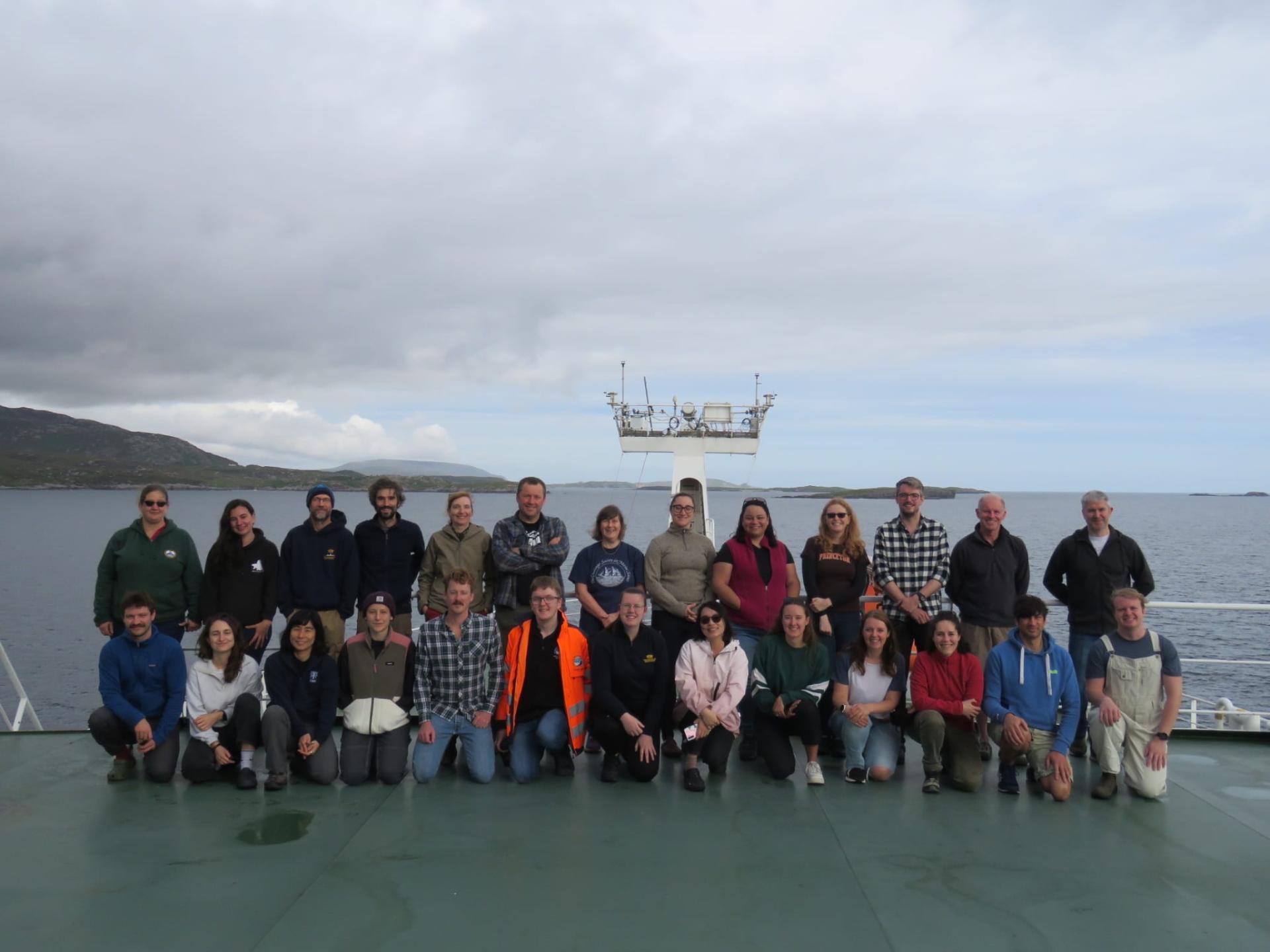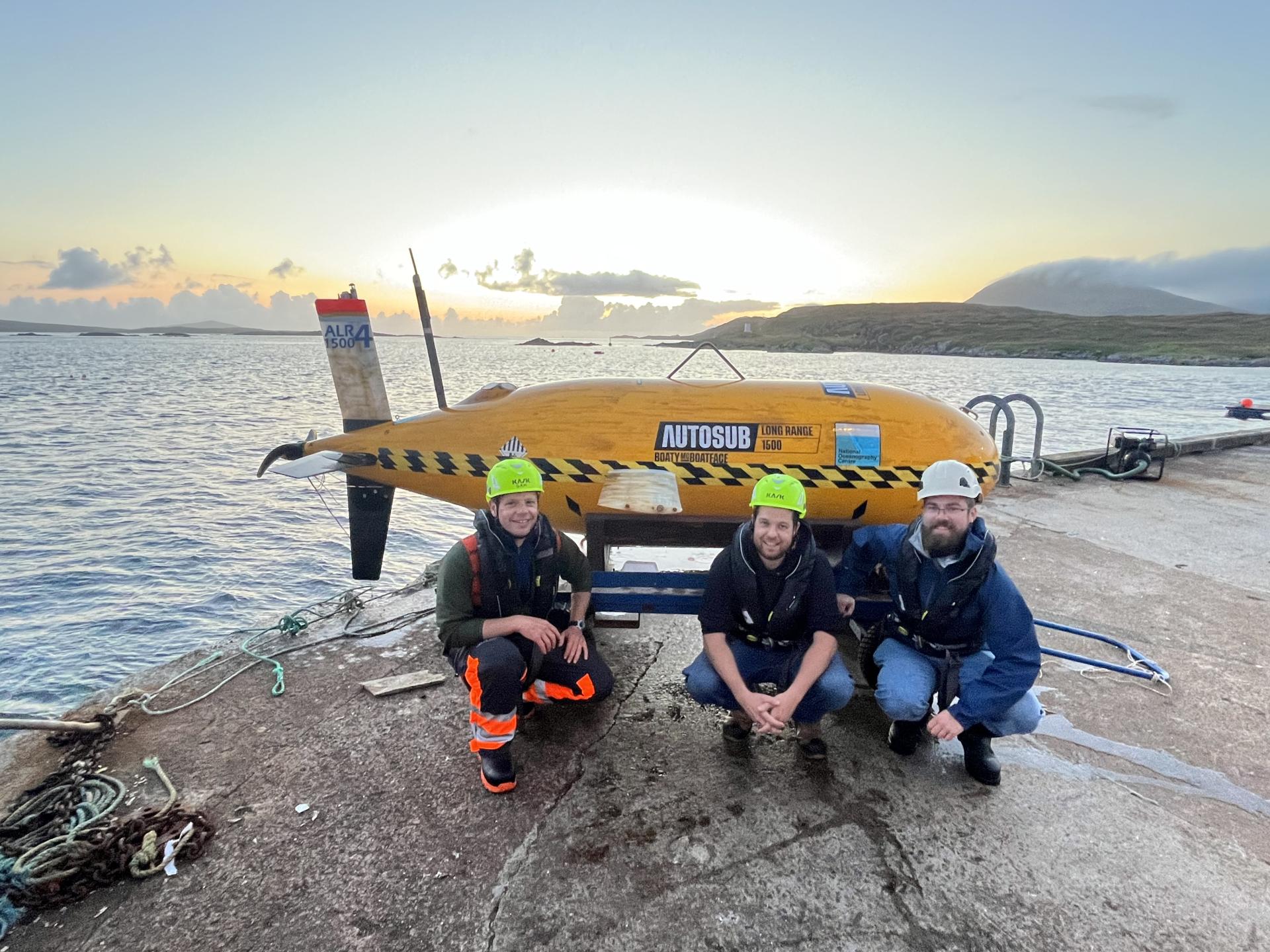
An international team of scientists and engineers led by researchers at the National Oceanography Centre (NOC), University of Southampton and Heriot-Watt University are in the midst of an intense six months of study to gain a better understanding of the role marine organisms play in storing carbon in the ocean.
An exciting combination of field research and cutting-edge autonomous tech will provide rare in situ observations across a whole seasonal cycle with intense sampling across the most biologically active seasons.
Scientists have already completed the first of two ambitious expeditions, this time on NOC’s world-leading research vessel RRS Discovery, kicking off months of fieldwork in the North Atlantic, south of Iceland. Scientists spent 37 days at sea to collect novel datasets and deploy robotic platforms to inform the next generation of climate modelling.
ALR 4, better known as Boaty McBoatface, has also completed its first ever country to country mission after being recovered by NOC engineers earlier this week. ALR 4 travelled for over two months, equipped with cutting-edge sensors, many developed by NOC, gathering critical data for BIO-Carbon research and beyond.
Addressing critical climate challenges
Scientists know that marine organisms play a critical role in storing carbon in the ocean that might otherwise remain in the atmosphere. However, recent evidence suggests that climate models are not fully accounting for the impact of potential changes in biological processes. This could hinder predictions of the ocean’s role in future carbon storage at a critical time.
The ambitious BIO-Carbon programme, funded by the Natural Environment Research Council (NERC), will help deliver the new understanding necessary to make robust predictions for how oceanic carbon storage may alter under climate change.
Speaking about the BIO-Carbon Programme expeditions, Programme Champion, Dr Adrian Martin, said: “Scientists, business leaders and politicians are asking whether we can manipulate the ocean to remove carbon dioxide from the atmosphere to reduce the effect of climate change. We clearly need to understand the side effects first, yet we still lack basic knowledge of how marine life will respond to climate change even before we perturb it further. These expeditions and the wider BIO-Carbon programme will deliver fundamental insights that will allow us to make robust predictions and informed decisions.”
The fieldwork and programme seek to address three critical climate relevant challenges. The project of Professor Stephanie Henson from NOC is gaining a better understanding of how climate change will affect the rate at which the marine ecosystem releases carbon dioxide by using organic carbon as a source of energy, in a process called respiration. In addition to using advanced cameras and robots to examine how carbon in dead organisms is consumed as it sinks, Stephanie and her team have deployed a new piece of equipment that acts like a freely drifting mini laboratory, which is quantifying the rate at which organic material is being respired in situ.

Led by Professor Mark Moore from the University of Southampton, another project is exploring primary production, the process by which carbon is removed from the surface of the ocean and transformed into organic matter. Primary production supports virtually all life in the sea. By combining elegant experiments that were conducted on board RRS Discovery with observations made by a fleet of robots and drifting floats throughout the year, Mark and his team are examining the relative importance of the availability of light and nutrients, as well as consumption by larger organisms, in controlling this key process.
Fieldwork led by Professor Alex Poulton from The Lyell Centre at Heriot-Watt University is gaining a better understanding of how specific organisms, called coccolithophores, which build intricate "shells" through a process called calcification, can affect the ability of seawater to absorb carbon dioxide from the atmosphere. To do this, Alex and the team have undertaken novel measurements and experiments at sea, using an innovative suite of new sensors on the ship, on ocean robots and on satellites to look at how viral infection and consumption by small animals influence coccolithophore “blooms”, often referred to as “white waters” or “white tides” by sailors.
During the Spring expedition, the team encountered a massive bloom of coccolithophores in the far northeast of the Atlantic. The current bloom in the Iceland Basin to the South of Iceland is roughly the size of Scotland.
Enabled by cutting edge technology

Additionally, a joint BIO-Carbon and FMRI mission has seen the use of two autonomous vehicles, ALR 4 and ALR 6, better known as "Boaty McBoatface", both equipped with a suite of cutting-edge sensors to analyse the biology and chemistry of the ocean. The sensors, many of which are developed at NOC, have provided the scientists with unprecedented amounts of information on the changing conditions in the ocean in near-real-time.
The mission marked the first country to country deployment for an ALR, with ALR 4 crossing the Iceland Basin from Vestmannaeyjar to Harris, in the Scottish Outer Hebrides. This is also the first time NOC engineers have deployed two ALRs simultaneously for one mission, pushing the boundaries of robotic ocean exploration.
Future fieldwork
The upcoming autumn BIO-Carbon expedition onboard the NOC-operated RRS James Cook will see the retrieval of the robotic platforms deployed on the spring expedition and a continuation of groundbreaking BIO-Carbon fieldwork.
Find out more about the BIO-Carbon programme and the fieldwork that is being undertaken.
Big science and solutions are enabled by innovative technology and world-leading facilities
Find out more about the ships and equipment, including ocean robots that we operate on behalf of the science community.
Find out more about the team developing new instruments and sensors at NOC.